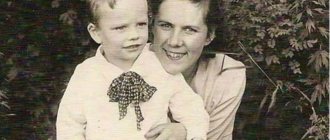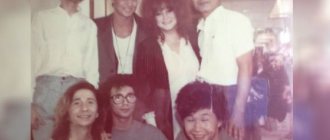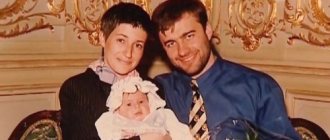Childhood and family of Dmitry Revyakin
Dima was born in Novosibirsk, and spent his entire childhood in Transbaikalia, in the Chita region, in the village of Pervomaisky.
He developed a passion for music as a child; Dima studied at a music school and learned to play the button accordion. His other hobby was reading. Mom taught literature, there were many books in the house. It was his mother who instilled her son’s love for books.
After graduating from school, the young man became a student at the Electrical Engineering Institute of Novosibirsk. Dima wrote poetry. It is known that he sometimes hosted student discos, acting as a disc jockey.
The beginning of the career of musician Dmitry Revyakin
As a student, Dmitry recorded several solo albums. One was called “The Board Broke Off”, and the other was called “All sorts of different songs”. He recorded them in one night. The students of his department were his first listeners. We can say that the future musical group began precisely with these solo albums. It should be noted that many of those songs became incredibly popular, but there were also some among them that were never performed publicly by Revyakin again.
Dmitry Revyakin and the Kalinov Most group
The Siberian rock band was officially organized in 1986. The music and lyrics were written by Dmitry. Dmitry Selivanov, who was a student at the same electrical engineering institute, was also at the origins.
Both Dmitrys were well known in their educational institution, both of them were eliminated by the commission selecting students for amateur artistic activities. The meeting under the office doors became the day the group was formed, which was initially called “Health,” which lasted a year. Then the Equinox group was organized. Only in 1986, Viktor Chaplygin and Andrei Shchennikov joined the duo, then the group was renamed, and a familiar name appeared - “Kalinov Most”.
Dmitry Revyakin: “I have never met a single Orthodox Christian in my life.”
The Kalinov Most group has always stood apart among the legends of Russian rock. Not only were they the first in Russia who began (and most importantly, did not stop) playing folk rock, but even now Dmitry Revyakin continues to amaze. Each record of the group is always something new, which, by the way, is completely surprising, because Revyakin did not start going to the rocking chair and jumping around the stage in shorts, and the musicians, although there are others (except for the eternally young Viktor Chaplygin ), clearly do not portray from Rammstein. Dmitry Revyakin told an NG correspondent about how Kalinov Most manages to change while remaining the same, and why there is no Orthodoxy in Russia.
— It is generally accepted that since 2000, “Kalinov Most” began a new stage of creativity (by the way, already the fifth. — Editor’s note), and, as you yourself said in one of your interviews, it is the last — eschatological. Is there really so little time left until the end of time?
— Of course, it’s not so easy to fit the creativity of Kalinov Most into a framework. Still, all these five conventional periods of our creativity flow into each other, and even the earliest ones still remind us of themselves now. Indeed, I tried to correlate the songs from the records “Ice March”, “Heart”, “Eskhato” and “Golden Oatmeal” with biblical values. At least this became conscious. Previously, it was done intuitively.
— Judging by the latest records, it’s as if you got a second wind. What inspires you now and how do you manage not to repeat yourself?
— For me, writing is the highest pleasure and the main joy in life. Therefore, oddly enough, when I see a white sheet of paper, inspiration comes naturally. I don't know how much talent is involved in this, but I really try not to repeat myself, keeping track of whether I've already done something similar or not. Of course, in any case, consonance cannot be avoided, but the constant expansion of vocabulary and the use of new poetic techniques allows us to avoid parasitizing on the old. This, in general, is the credo of Kalinov Most. We strive for versatility in our creativity.
— So you never had a desire to re-record, for example, the album “Volnitsa” in the studio? And then also release it on vinyl?..
— I’ll say right away that at concerts we play almost all the songs from Volnitsa. Only three remain undeveloped. I think that when we play concerts in support of the new album “Contra”, which we are currently working on, they will also come in handy. As for recording this record in a new way, I don’t see any point in going back to the old way. Here I would have time to deal with new material, which requires a lot of attention and effort. My third book of poetry will be released soon, and work on solo albums is underway. There is no time to relax and rest on your laurels. There is still a lot to be done.
— When can we expect a new solo album? Does it even make sense to release albums not under the Kalinov Most banner?
- There's a meaning. In this way I try to attract other colors into my work. Often musicians who are not related to the group play with me, so a different interpretation is inevitable. For example, “Harvest” is clearly not “Kalinov Most”. Yes, the voice is the same and the poetics are largely similar, but the presentation is completely different. But this is not the most important thing. I record solo albums because I'm very prolific. I have a lot of material, so I'm trying to earn money on the side (laughs). As for the new solo record, one is already ready. And for a long time. Anaxagoras Vladykin made arrangements for it, it is called “Grandi Canzoni. Opus 1", but it is very difficult to attach it somewhere. Active work is underway on a second solo album. She will also be included in the Grandi Canzoni series.
— There was an anti-Soviet period in your work. It didn't last long. Now the situation in the country is tense. Was there a desire to resume it again?
— We have recorded a new album, “Contra,” which, I hope, will soon be presented to the public. It is, in my opinion, just sharp enough. Of course, it’s still Kalinov Most...
— That is, no “TV” group? Won't you call things by their proper names? Do you want to sing, like Mikhail Borzykin, some “Kremlyad”, so that you too will be removed from rotation on the radio?
— Mikhail Borzykin is a misanthropic person, and I think that he suffers from this. It seems to me that now no one is prohibiting anyone from doing anything. You can sing whatever you want, say whatever you want, look whatever you want. Still nothing changes.
— You are a person who has come a long way (you even flirted with paganism at one time), but still accepted Orthodoxy...
“I can’t say that I flirted with paganism.” Rather, it was simply my way of understanding the world and relationships between people. I want to say that this path is still going on. However, now I can say that I have different values. Yes, I am baptized, but I cannot yet say that I am Orthodox. To be honest, I have never met a single Orthodox Christian in my life.
— As far as I know, you really like the work of Velimir Khlebnikov. In one of your interviews you even said that he is, in fact, the king of Russian poetry. However, you cannot say that Khlebnikov greatly influenced your work...
— Khlebnikov’s work had a rather strong impact on me personally. I studied his legacy quite a lot and even, one might say, lived by it - I was so interested in it. The only thing that did not touch me was his Pythagoreanism. As for poetics, his love for the Russian language and in general for Slavic roots, from which he could create anything, fascinated me.
— Recently, the media have begun to exaggerate situations with, let’s say, careless priests who, to put it mildly, do not behave very correctly...
- Sorry, but I don’t even want to discuss this topic. It’s just that now is the background of the era - there is no point in condemning someone, you need to live your life and solve your problems. We are trying to talk about religiosity, but it is useless. It's practically non-existent. Yes, there are temples, there are priests in robes, but this does not change anything. No content. That's why there is nothing. And it won't happen anymore. These are the feelings I live with now.
— What is the main metamorphosis, in your opinion, that has occurred with Russian rock? Is there anything worthy now?
— In general, it’s hard to surprise and inspire me in this regard, because for me performance is not the most important thing. I definitely need poetry. I always start listening to how the phrase is constructed, what metaphors and rhymes the author used, how the rhythmic structure changes. I listen mainly to the commands that I listened to before. This is how the trail from “Aquarium”, “Alice”, “DDT”, etc. remained, and so it is. I keep listening to them if they release something new. Young people do not interest me with their worldview. For me it is too primitive and straightforward. Everything is based on marketing, so the task for musicians is completely different. All these lesbian and gay issues don't interest me. The only thing if you can still call this group young is “Spleen”. I consider Vasiliev a real poet. All the rest are swindlers, I don’t perceive them as musicians, much less as individuals.
- As far as I know, you practically don’t listen to anything. This is true? Isn't this necessary to develop?
- Of course, you need to listen, but I don’t listen (laughs). This often happens in life - it seems like you should, but you don’t do it.
Information: The Kalinov Most group was created in the mid-1980s in Novosibirsk. Initially, the team was a union of friends and like-minded people of Dmitry Revyakin, who met as a result of studying together at the Novosibirsk Electrotechnical Institute. The group's first rehearsals took place in NETI dormitories, concerts were held in cultural centers and other institutions of the city. The original (“golden”) line-up of the group includes four people: Dmitry Revyakin (vocals, acoustic guitar, songwriter), Vasily Smolentsev (guitars), Andrey Shchennikov (bass, backing vocals), Victor Chaplygin (drums). Sometimes guest musicians joined the group for a short time, but in general the “golden” line-up remained until 1993.
By the way: The name “Kalinov Bridge” was suggested at one of the first rehearsals of the group by Dmitry Revyakin’s girlfriend Olga, who later became his wife
Dmitry Revyakin and Kalinov Most
The guys held their first performance at the Electrical Engineering Institute. Soon Konstantin Kinchev met Revyakin and the guys from Most. It was he who contributed to the fact that the group from Siberia came to Leningra with a concert. From its very first performance, “Kalinov Most” amazed the audience.
Largely thanks to Revyakin’s original poetry and original melody, the concert in Moscow was a great success. The creative power of the group surprised the audience. It is known that the group did not receive a prize because of Dmitry, who sang into the microphone a word that should not have been used. Although the swearers were left without a prize, they became known throughout the country.
Dmitry Revyakin: I can’t stay away from politics
On the eve of the event, Deputy Chief Editor of Reedus Andrei Gulyutin and special correspondent Andrei Krasnoshchekov went down to the basement of the ProZvuk rehearsal base, which is adjacent to the Russian State University for the Humanities, to observe how the final stages of preparation for the concert were going on.
Together with the members of Kalinov Most, the head of the frontman of the group 25/17, Andrei Bledny, rested on the low ceilings of the studio, having come with his colleague Ant to take part in the rehearsal, and, as it turned out, in the upcoming concert itself.
Again, as it turned out, 25/17 will perform together with Kalinov Most the joint track “Ship” recorded three years ago, as well as a new “collaboration”, the title song from the new album of the rap group “Podorozhnik”. As Bledny noted, those who come to the concert on Friday will have a unique opportunity to listen to these things arranged by the Most musicians, and not 25/17.
After the rehearsal, the musicians quickly got ready to go out; Revyakin lingered to clarify organizational issues with Bledny about the upcoming event. It is worth noting that the hero of the day was in a rather nervous state, swore at someone on the phone, nervously answered his interlocutors, Bledny even grinned at the journalists with the words: “I don’t even know what answers you will get to your questions now”...
© Andrey Krasnoshchekov/Ridus.ru
But by the start of the conversation, Dmitry Alexandrovich had completely transformed; Gulyutin, on top of everything else, immediately held the ceremony of asking for an autograph that had been prepared for the end: our colleague Dmitry Stroganov, a passionate collector of vinyl, on the occasion handed over the 1992 record “Darza”, which he had been begging for a long time from his father as a teenager. The appearance of such a rarity could not help but set the right tone for the conversation.
Andrey Gulyutin (AG): To be sure to clarify first-hand, I’ll ask right away: personally, are you positioning the upcoming concert on Friday as an anniversary concert, that is, not an ordinary “solo concert”, is this not a marketing ploy of the club?
Dmitry Revyakin (DR): Well, of course, it will be special. The guests will come first. Yes, and we didn’t celebrate my 50th birthday in Moscow... well, so we decided to celebrate, GlavClub is right in saying that the concert should be interesting.
© Andrey Krasnoshchekov/Ridus.ru
AG: Is anyone else announced besides 25/17? Can the list be announced, or is this a surprise for the public?
DR: Yes, of course, this is Helavisa, “Mill”, Alexander F. Sklyar and another, let’s say, “mysterious guest”, he asked not to give his name for... these... commercial-religious reasons.
AG: As I see on the paper that lies on the table in front of us, 25 songs are listed, is this the track list for the concert? How many songs are planned for Friday?
DR: Well, yes, this is the main set, and there’s probably more, well, in general, as always...
AG: By the age of 50, whether you like it or not, you take stock of some life results. Intermediate. They even start to let you down even earlier, I know it myself. How are you doing with this? Do you feel... no, not satisfaction, a creator and musician can never be satisfied... but are you satisfied with the baggage you came with?
DR: It’s a sin to complain about life, the group is still functioning, recording records, and there is creative exchange with other musicians. Time does not stand still; some symbioses turn out to be successful or unsuccessful. The word “satisfied” is also not appropriate here. Everything goes as it goes, it apparently should go that way...
© Andrey Krasnoshchekov/Ridus.ru
AG: Are you not planning on retiring, or are you thinking about playing and performing until the end? Are you tired?
DR: No, how tired! Well, unless there is no physical or emotional fatigue, yes, there are a lot of plans, a lot of ideas, and we will definitely try to implement them all. It's too early to retire...
AG: By the way, you talked about symbioses. Indeed, Kalinov Most is one of the few groups on our stage that interacts with other performers of various styles and ages. Bledny wonderfully noted that fans of 25/17’s creativity after the “collaborations” became acquainted with surprise and joy with your work. Is this a conscious move, or does it somehow happen organically due to the ability to find mutual interest with colleagues?
DR: There is, of course, an element of mutual sympathy here. Otherwise there would be no cooperation. If there is sympathy and you like the work of this or that group, there is an opportunity to somehow interact, to do something together, and if such cooperation does not spoil the creative fabric, then cooperation of this kind is usually successful.
© Andrey Krasnoshchekov/Ridus.ru
Andrey Krasnoshchekov (AK): Continuing with this question, it may seem banal, but I’m sure it’s interesting and few people know. How did your acquaintance with Andrei Pozdnukhov turn out, Dmitry? When did you learn about each other’s work and under what circumstances did you meet in person? You spoke about sympathy as a necessary condition for cooperation. How did your mutual sympathy grow? On a religious issue, attitude to history, social processes, or on some other planes?
DR: There are a number of positions on which there are coincidences. Firstly, 25/17 are Siberians, I have a special, warm relationship with Siberians. I’ve heard for a long time that there is such an Omsk group, well, and finally we met. In particular, I’m interested in how they work with versification, I listened carefully to their tracks, it’s because of versification that they sometimes have such complex verbal traps... they get out of them very gracefully, and I’m extremely impressed by this because I myself value the word extremely and I am busy with words...
© Andrey Krasnoshchekov/Ridus.ru
Andrey Bledny (AB): I heard “Kalinov Most” for the first time, of course, when I was still at school. For me, communication with both Dmitry Aleksandrovich and Konstantin Evgenievich (Kinchev - note by Reedus) is still not even a dream come true - I didn’t even dream about it as a child, this is for me, no matter how pathetic it is it sounded like a miracle. For me, these are people from the planet of giants. Probably, at the moment, we too have become some kind of magnitude for someone, but we don’t feel like such, well, and when communicating with those whom I listened to back in school, this is all completely leveled out. I again feel like that curly-haired schoolboy who rewound tapes with a pencil. We met Dmitry Aleksandrovich when an attempt was made on one Internet channel to revive the “Sharks of the Feather” program, well known in the past. We were recording on the same day and, I remember, I then went up to Dmitry Alexandrovich to pay respects, saying that we are also from Omsk, we also do music... I thought that Dima didn’t know us at all - well, where are we from - we seem to be working in a completely different direction ... for people of his generation, this is all probably all somehow frivolous: some kind of rap shmup... and Dima in response said that he knows one Omsk group... well, I think now he’ll call it “Civil Defense” - of course, who doesn’t knows... and he suddenly calls: 25/17! That's how we met...
© Andrey Krasnoshchekov/Ridus.ru
AK: And how long did it take you to end up in the studio together?
AB: And in about a couple of months. Dima called and offered to take part in the planned tribute to Kalinov Most, which, however, never took place. But I proposed to do something new and special, we met, talked, exchanged ideas, and so the song “Ship” was born in 2011.
AK: So, can we ever expect 25/17 to release a cover of one of the Kalinov Most songs?
AB: Yes, perhaps such an idea will come true. We have an idea to record one of their covers. We really like “Siberian March”, for example... It’s just that Dima has such songs that somehow doing cover versions of them is a big challenge, it’s difficult to cope with... it’s difficult to do it differently - they sound just so normal , and that's it. Well, it’s impossible to do the same...
AG: Do you remember your first concert in the capital?
AK: Probably it was a festival in Podolsk?
DR: Our first concert in Moscow took place in March 1988. First we played in Dolgoprudny, then we played at the premiere of Assa. And Podolsk, this is Podolsk, we performed there in September 1987...
AK: Did you play “Dudki” for the first time there? I once interviewed you, and you admitted that “Pipes” is your first such rebellious political song... is it relevant now?
DR: Well, then for the first time we played it here, we performed it at concerts before Podolsk. And now I eat it sometimes...
Performance of the group "Kalinov Most" at the rock festival Podolsk-87
YouTube screenshot
AG: Do you think a musician should participate in political processes and express views on what is happening? To each his own? Or is it better to stay away?
DR: Well, how could it be otherwise? How can this be avoided? I don't understand at all. Yet everything around is permeated with likes and dislikes that it is simply impossible to get around it all. Moreover, these sympathies can change back and forth... Everything around is so torn, discrete and atomic that it is simply impossible to maintain any kind of calm for the Dalai Lama. On the contrary, you need to react and thereby free yourself. In any case, I personally can’t stay away, I can’t sit still!
AK: Since we are talking about politics, then, of course, I would like to touch on something that is relevant, although not pleasant. Moreover, my question is not idle. I worked on Maidan for 23 days, then I was in Crimea, and last week I returned from Slavyansk - in total I spent 70 days in the south-east of Ukraine. I don’t expect you to evaluate what is happening, although that would be interesting, but I want to know what kind of experiences they cause inside?
DR: As a person who is not indifferent to the fate of the white population on the Eurasian ecumene, of course, I am deeply worried, all this is catastrophic and I can’t even imagine how everyone will then be reconciled...
© Andrey Krasnoshchekov/Ridus.ru
AK: So, something like the song “Rakhunok” can still be expected?
DR: “Rakhunok” is something special... it’s a photograph - information that circulated at that time, plus my personal impressions...
AB: We recorded it within two days and immediately posted it online. The track, of course, turned out raw, but we tried to present it that way, we wanted it to sound raw in order to capture the life in it...
DR : I think this track is extremely successful. And we can’t show anything for it! This is how we saw it, this is how it was sung. And who interprets it... well, write your other songs, what’s the problem?! I’m glad that Andrey responded, Anton Ant made a musical series for it... everything was done quickly on a whim, some of the poems were written right in the studio... and I also remember the weather was gloomy, and in those days the sun came out. That’s what I told Anton then: that means we’re doing everything right!
AG: Then I’ll say it again to record it. The lines about “Comandante Yarosh” cause misunderstanding among many listeners. They don’t need to look for background information, is it just a copy of the events? Is everything right?
DR: Absolutely. There are no likes or dislikes here, everything is clear and informative. I sing clearly, Andrey sings clearly, Anton sings clearly. We sang on purpose to record the situation, to stop it, so that it would not grow further. But everything turned out the other way around...
© Andrey Krasnoshchekov/Ridus.ru
AB: And we decided not to perform this song at concerts...
DR: The song remained in that time, along with the events on the Maidan...
AG: Then let's talk about the future. Are there any new things in the works? When can we expect a new album?
DR: We are now stuck on... well, how can I say, it will be such a semi-bardic album... about Kamchatka, it will be called “Cyclone” and will be entirely dedicated to the Kamchatka Peninsula. Tired of sociality. I want lyrics. Tired of loading people and loading themselves...
Dmitry Revyakin's move to Moscow
A year later, Revyakin and the group were again in Moscow, where they were supposed to perform. There I met Stas Namin. He invited the guys to record in his studio. So, in the fall of 1988, Kalinov Most moved in full force to Moscow.
The year has been difficult. In reality, everything was not as rosy as we wanted: unsuccessful concerts, disrupted recordings, discord in the team. Reunited with the original lineup, the group returned to their homeland. It was Revyakin who initiated the reunion of all the guys. In Novosibirsk, “KM” practiced new songs, and only came to the capital for concerts or to record an album.
Golden time in Revyakin’s work: discography of “Kalinov Most”
Dmitry Revyakin considers the time after returning from Moscow to be golden. There was complete mutual understanding in the group. He wrote a lot of songs during that period, sometimes he wrote several songs in one day. He did this in any conditions: on the bus, in a hotel, between rehearsals, in the studio, and so on.
In the early nineties, the result of the poet and musician’s work began to resemble ethnic rock, “neofolk”. Russian dance intonations, shamanic chants, and chants of nomadic peoples appeared. The world of Dmitry's poetry is plotless, abstract figurative series, metaphors. Revyakin's vocals change from an aggressive growl to soaring, light, almost folk singing.
In 1992, the group practically broke up. Only Revyakin and Smolentsev remained. Together they had to work on “Ulchi Belt” - an epic song that is the peak album of the group.
Over the course of several years, the guys kept getting together and then scattered again. In 1995, the album “Traven” was released, which became their highest-grossing album. After that, “KM” was gone. Kalinov Most was reunited again only in 1997. Revyakin and the group went on tour to London, where the guys performed at the University. Dmitry was very surprised to realize in England that one could dance to his music.
In 1998, Revyakin, together with “KM,” became a participant in the London festival, and soon the guys went on a voyage abroad. They performed in Iraq and Israel. There Dmitry continued to work, he wrote two songs.
Dmitry Revyakin
Childhood and family of Dmitry Revyakin
Dima was born in Novosibirsk, and spent his entire childhood in Transbaikalia, in the Chita region, in the village of Pervomaisky. He developed a passion for music as a child; Dima studied at a music school and learned to play the button accordion. His other hobby was reading. Mom taught literature, there were many books in the house. It was his mother who instilled her son’s love for books. After graduating from school, the young man became a student at the Electrical Engineering Institute of Novosibirsk. Dima wrote poetry. It is known that he sometimes hosted student discos, acting as a disc jockey.
The beginning of the career of musician Dmitry Revyakin
As a student, Dmitry recorded several solo albums. One was called “The Board Broke Off”, and the other was called “All sorts of different songs”. He recorded them in one night. The students of his department were his first listeners. We can say that the future musical group began precisely with these solo albums. It should be noted that many of those songs became incredibly popular, but there were also some among them that were never performed publicly by Revyakin again.
Dmitry Revyakin and the group Kalinov Most The Siberian rock group was officially organized in 1986.
The music and lyrics were written by Dmitry. Dmitry Selivanov, who was a student at the same electrical engineering institute, was also at the origins. Both Dmitrys were well known in their educational institution, both of them were eliminated by the commission selecting students for amateur artistic activities. The meeting under the office doors became the day the group was formed, which was initially called “Health,” which lasted a year. Then the Equinox group was organized. Only in 1986, Viktor Chaplygin and Andrei Shchennikov joined the duo, then the group was renamed, and a familiar name appeared - “Kalinov Most”.
Dmitry Revyakin and Kalinov Most
The guys held their first performance at the Electrical Engineering Institute. Soon Konstantin Kinchev met Revyakin and the guys from Most. It was he who contributed to the fact that the group from Siberia came to Leningra with a concert. From its very first performance, “Kalinov Most” amazed the audience. Dmitry Revyakin -Kalinov most / Dmitry Revyakin “MODNAYA” Largely thanks to Revyakin’s original poetry and original melody, the concert in Moscow went off with a bang. The creative power of the group surprised the audience. It is known that the group did not receive a prize because of Dmitry, who sang into the microphone a word that should not have been used. Although the swearers were left without a prize, they became known throughout the country.
Dmitry Revyakin's move to Moscow
A year later, Revyakin and the group were again in Moscow, where they were supposed to perform.
There I met Stas Namin. He invited the guys to record in his studio. So, in the fall of 1988, Kalinov Most moved in full force to Moscow. The year has been difficult. In reality, everything was not as rosy as we wanted: unsuccessful concerts, disrupted recordings, discord in the team. Reunited with the original lineup, the group returned to their homeland. It was Revyakin who initiated the reunion of all the guys. In Novosibirsk, “KM” practiced new songs, and only came to the capital for concerts or to record an album.
Golden time in Revyakin’s work: discography of “Kalinov Most”
Dmitry Revyakin considers the time after returning from Moscow to be golden.
There was complete mutual understanding in the group. He wrote a lot of songs during that period, sometimes he wrote several songs in one day. He did this in any conditions: on the bus, in a hotel, between rehearsals, in the studio, and so on. In the early nineties, the result of the poet and musician’s work began to resemble ethnic rock, “neofolk”. Russian dance intonations, shamanic chants, and chants of nomadic peoples appeared. The world of Dmitry's poetry is plotless, abstract figurative series, metaphors. Revyakin's vocals change from an aggressive growl to soaring, light, almost folk singing. In 1992, the group practically broke up. Only Revyakin and Smolentsev remained. Together they had to work on “Ulchi Belt” - an epic song that is the peak album of the group.
Dmitry Revyakin: “There is no need to compete with Tsoi” For several years, the guys either got together, then scattered again. In 1995, the album “Traven” was released, which became their highest-grossing album. After that, “KM” was gone. Kalinov Most was reunited again only in 1997. Revyakin and the group went on tour to London, where the guys performed at the University. Dmitry was very surprised to realize in England that one could dance to his music.
In 1998, Revyakin, together with “KM,” became a participant in the London festival, and soon the guys went on a voyage abroad. They performed in Iraq and Israel. There Dmitry continued to work, he wrote two songs.
Revyakin currently
Dmitry's performance lately can be called exorbitant. One, and sometimes two, albums are released annually, and all of them are of excellent quality. It cannot be said that he put his creativity on stream.
Dmitry Revyakin now regularly releases new albums
In 2007, “KM” released an album called “Ice March.” This name directly refers to such a historical event as the retreat of Kolchak’s army in Transbaikalia. According to Revyakin, the revival of Russia will begin precisely from the East.
Since the end of 2010, Dmitry began working on a solo project. In 2012, his solo album was released, where each work is like a small masterpiece. This work can be called varied and strong, all the songs there are not similar to each other.
Personal life of Dmitry Revyakin
It is known that the name of the group was suggested by Dmitry’s girlfriend, who later became his wife and muse.
Her name was Olga. The marriage produced a son. However, Dmitry's wife died, and he is raising his son alone. The album “Heart”, released by the KM group in 2009, was dedicated to Revyakin’s deceased wife.
Now the musician lives permanently in Moscow, where he continues his work with the KM group; his parents remain in Chita.
Revyakin currently
Dmitry's performance lately can be called exorbitant. One, and sometimes two, albums are released annually, and all of them are of excellent quality. It cannot be said that he put his creativity on stream.
Dmitry Revyakin now regularly releases new albums
In 2007, “KM” released an album called “Ice March.” This name directly refers to such a historical event as the retreat of Kolchak’s army in Transbaikalia. According to Revyakin, the revival of Russia will begin precisely from the East.
Since the end of 2010, Dmitry began working on a solo project. In 2012, his solo album was released, where each work is like a small masterpiece. This work can be called varied and strong, all the songs there are not similar to each other.











